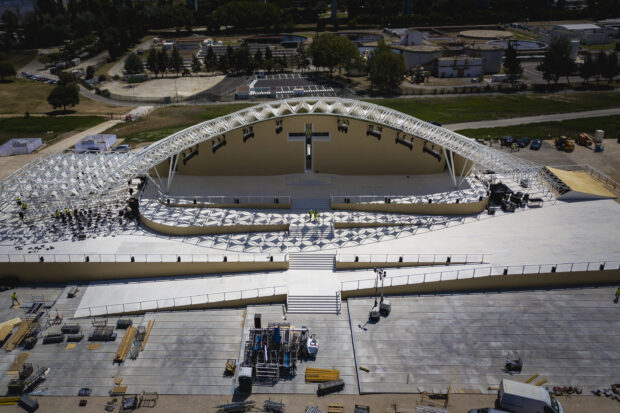
This aerial picture taken on July 27, 2023 shows the main stage at the venue for World Youth Day (WYD), where Pope Francis will celebrate the closing mass, in Lisbon. AFP
VATICAN CITY — World Youth Day, which takes place next week in Lisbon in the presence of Pope Francis and an expected one million pilgrims, is the largest Catholic event in the world.
Initiated in 1986 by Pope John Paul II, the global gathering is normally held every two or three years, although the calendar was disrupted by the coronavirus pandemic and the most recent World Youth Day was in Panama City in 2019.
The 16th international edition this year runs from August 1 to August 6, presided over by 86-year-old Pope Francis, making his first trip abroad since undergoing hernia surgery in June.
The week revolves around a series of cultural, spiritual and festive events, from concerts to debates and prayer sessions.
Events are targeted at Catholics between the age of 16 and 35, although organisers insist that everyone is welcome to attend, with no registration necessary.
More than 700 bishops and 20 cardinals will attend, alongside 20,000 volunteers and pilgrims from more than 200 countries, according to the Vatican.
The young people will initially spend time in different dioceses across Portugal, before gathering in the capital, which is preparing with about 16,000 members of law enforcement and emergency services to be deployed.
World Youth Day is spread across several venues in Lisbon, a city of 550,000 inhabitants already busy with summer tourists.
Key moments with the pope include Thursday’s welcome ceremony, the Stations of the Cross on Friday, a vigil on Saturday night and large mass on Sunday morning.
The Argentine pontiff is expected to address themes such as climate change, social media and the scandal of clerical sex abuse of children that has caused enormous damage to the reputation of the worldwide Catholic Church.
The first international World Youth Day was held in Rome in 1986, following two successful gatherings of young people in the Italian capital in 1984 and 1985.
Then came Buenos Aires in Argentina (1987), Santiago de Compostela in Spain (1989), Czestochowa in Poland (1991), Denver in the United States (1993) and Manila in the Philippines (1995).
They were followed by Paris, France (1997); Rome again in 2000; Toronto, Canada (2002); Cologne, Germany (2005); Sydney, Australia (2008); Madrid, Spain in 2011; and Rio de Janeiro, Brazil in 2013.
The biggest event was Manila, which drew five million pilgrims, followed by Rio de Janeiro with 3.7 million, and Krakow, Poland in 2016 with three million.